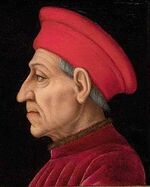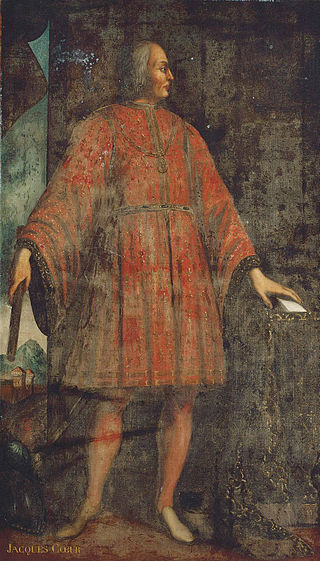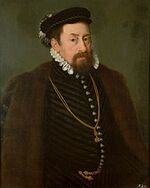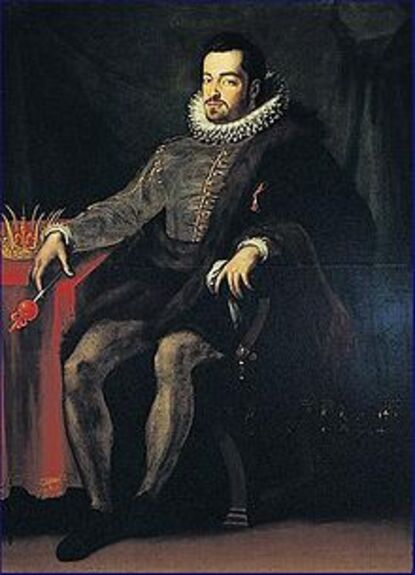-
31 July 1192 – Richard the Lionheart landed on Jaffa and defeated the army of Saladin
1402 – Death of Edmund of Langley, 1st Duke of York, son of Edward III of England and Philippa of Hainault

1464 – Death of Cosimo de' Medici, Italian ruler

1498 – Christopher Columbus becomes the first European to visit what is now Venezuela.

1527-Henry VIII to Anne Boleyn
For a present so beautiful that nothing could be more so I thank you most heartily, not only for the splendid diamond and the ship in which the solitary damsel is tossed about, but also for the pretty interpretation and too humble submission made by your benignity. I should have found it difficult to merit this but for your humanity and favor, which I have sought and will seek to preserve by every kindness possible to me; and this is my firm intention and hope, according to the motto, Aut illic aut nullibi. Your letter, and the demonstrations of your affection, are so cordial that they bind me to honor, love and serve you. I desire also, if at any time I have offended you, that you will give me the same absolution that you ask, assuring you that henceforth my heart shall be devoted to you only. I wish my body also could be. God can do it if he pleases, to whom I pray once a day that it may be, and hope at length to be heard. "Escripte de la main du secretaire qui en ceur, corps et volonte est vostre loiall et plus assure serviteure

The time seems so long since I heard of your good health and of you, that I send the bearer to be better ascertained of your health and your purpose; for since my last parting from you I have been told you have quite given up the intention of coming to court, either with your mother or otherwise. If so, I cannot wonder sufficiently; for I have committed no offence against you, and it is very little return for the great love I bear you to deny me the presence of the woman I esteem most of all the world. If you love me as I hope you do, our separation should be painful to you. I trust your absence is not wilful on your part; for if so, I can but lament my ill fortune, and by degrees abate my great folly.

1528-Henry VIII to Anne Boleyn
Writes to tell her of the great "elengenes" he finds since her departure, "for, I ensure you, me thinketh the time lenger since your departing now last than I was wont to do a whole fortnight." Could not have thought so short an absence would have so grieved him, but is comforted now he is coming towards her; "insomuch that my book maketh substantially for my matter; in token whereof I have spent above four hours this day, which caused me to write the shorter letter to you at this time by cause of some pain in my head. Wishing myself specially an evening in my sweetheart's arms, whose pretty dubbys I trust shortly to cusse."

1530-THE DIVORCE.
Papal mandate, inhibiting all persons, on pain of excommunication, from writing or intermeddling with the said cause, contrary to their conscience, through hope of reward or favor of any kind.

1536-Lady Bryan to Cromwell.
I beseech you to be good lord to me now in the greatest need that ever [was], for it hath pleased God to take from me him ("hem") that was my most com[fort] in this world, to my great heaviness, Jesu have mercy on his soul, a[nd] I am succourless and as a redeless creature but for my great trust in the King and your good lordship. When your lordship was last here you bade me not mistrust the King or you, which gave me great comfort, and encourages me now to show you my poor mind. When my lady Mary was born the King appointed me lady Mistress, and made me a baroness; "And so I have been a m[other] to the children his Grace have had since." Now, as my lady Elizabeth is put from that degree she was in, and what degree she is at now I know not but by hearsay, I know not how to order her or myself, or her women or grooms. I beg you to be good lord to her and hers, and that she may have raiment, for she has neither gown nor kirtle nor petticoat, nor linen for smocks, nor kerchiefs, sleeves, rails, bodystychets, handkerchiefs, mufflers, nor "begens." "All thys har Graces mostake I have dreven of as long as I can, that, be my trothe, I cannot drive it no lenger."
Mr. Shelton says he is master of this house. "What fashion that shal be I cannot tel, for I have not sen it afore." I trust to your lordship, who, as every man reports, loveth honor, to see this house honorably ordered, "howsom ever it hath been aforetime." If the head of [the same] know what honor meaneth it will be the better ordered; if not, it will be hard to bring it to pass. Mr. Shelton would have my lady Elizabeth to dine and sup every day at the board of estate. It is not meet for a child of her age to keep such rule. If she do, I dare not take it upon me to keep her Grace in health; for she will see divers meats, fruits, and wine, that it will be hard for me to refrain her from. "Ye know, my lord, there is no place of correction there; and she is too young to correct greatly." I beg she may have a good mess of meat to her own lodging, with a good dish or two meet for her to eat of; and the reversion of the mess shall satisfy her women, a gentleman usher, and a groom; "which been eleven persons on her side." This will also be more economical.
My lady has great pain with her teeth, which come very slowly. This makes me give her her own way more than I would. "I trust to God and her teeth were well graft to have her Grace after another fashion than she is yet; so, as I trust, the King's Grace shall have great comfort in her Grace. For she is as toward a child and as gentle of conditions as ever I knew any in my life, Jesu preserve her Grace. As for a day or two at a hey time or whansomever it shall please the King's Grace to have her set abroad, I trust so to endeavour me that she shall so do as shall be to the King's honor and hers; and then after to take her ease again. I think Mr. Shelton will not be content with this. He may not know it is my desire, but that it is the King's pleasure and yours it should be so." From Hunsdon with the evil hand of your daily bede woman.
Apologises for her boldness in writing thus.

1541 – Death of Simon Grynaeus, German theologian and scholar
1545 –Birth of Andrew Melville, Scottish theologian and scholar

1555 – Birth of Edward Kelley, English spirit medium
1589 – Death of Jacques Clément, assassin of Henry III of France
source:wikipedia,http://www.british-history.ac.uk/
-
31 July 1423 – Hundred Years' War: Battle of Cravant – the French army is defeated by the English at Cravant on the banks of the river Yonne.
1451 – Jacques Cœur is arrested by order of Charles VII of France.

1498 – On his third voyage to the Western Hemisphere, Christopher Columbus becomes the first European to discover the island of Trinidad.
1527 –Birth of Maximilian II, Holy Roman Emperor

1540-Henry VIII. to Wallop and Carne.
Since his last advertisement of affairs here, things have occurred which are to be declared to the French king and others. Upon the petition of Parliament being declared to lady Anne of Cleves, she agreed to the decision of the matter by the clergy, who gave sentence that the marriage was not vailable. If causes are asked for, they may say, as they did to the cardinal of Ferrare, that the King would not do anything that could not lawfully be bidden by, and it is sufficient that the cause is known to those who had the examination thereof, who in this case are fully to be trusted. Lady Anne approved the sentence, confessing the integrity of her body, and refusing all who would move her to the contrary, and desired to remain here as a servant and subject. Informed her that she could not remain Queen, but, for the honour of her house and respect for herself, he would entertain her as a sister in honourable estate; and sent her a token, for which she wrote a gentle letter of thanks. Has assigned her lands, with two goodly houses and an allowance of 500l., a year, amounting in all to 5,000 marks a year. She is quietly established in her own house as the King's sister, being resolved not to return, as she herself has written to her brother. Sends a small memorial for their better information.
Having received their letters of the 13th, which state that the ambassadors of Cleve are departed and recount the conversation of Wallop's secretary with the queen of Navarre, desires Carne to take leave of the French king and return, and also to take leave of the queen of Navarre, Wallop asking her to tell Carne the matter which she mentioned as something which the King would be contented to hear, and which would make him laugh.
1544-Catherine Parr to Henry VIII
This afternoon came letters from the Lieutenant of the North declaring the apprehension, by fishermen of Rye, of a Scottish ship wherein were certain Frenchmen and Scots sent with letters and credence to the French king and others. Thinks their apprehension much important, and ordained of God to show the "crafty dealing and juggling of that nation." Encloses the most important of the letters, of which there are many to the French king and others, from the Dowager and others, but they are only for credence or else to the same effect as these. The Council have sent for the chief of the Scots and Frenchmen for examination. The Prince and the rest of the King's children are in good health. Hampton Court, 31 July

Princess Elizabeth to the Queen.
Inimical fortune,envious fortune for a whole year deprived me of your presence and, not content therewith, has again despoiled me of that benefit. Knows she has the Queen's love who, she hears, has not forgotten her in writing to the King. Begs the Queen "che scrivendo a sua Maesta si degni de raccomend[armel prie]gando sempre sua dolce benediccione; similmente pri[eghando i]l Signore Iddio gli mandi successo bonissimo, acquis[tando vittoria de] suoi inimici, accioche piu presto possia vostra A[ltezza et io insiem]e con lei rallegrarsi del suo felice retorno. N[on altro priegho Id]dio che conserve sua Illustrissima Altezza, alla cui gr[atia, humilmente b]asciando le mani, m'offero et raccom[mendo. Da Santo] Jacobo, alli 31 di Julio.
From The Anne Boleyn Files:
Inimical fortune, envious of all good and ever revolving human affairs, has deprived me for a whole year of your most illustrious presence, and, not thus content, has yet again robbed me of the same good; which thing would be intolerable to me, did I not hope to enjoy it very soon. And in this my exile I well know that the clemency of your highness has had as much care and solicitude for my health as the king’s majesty himself. By which thing I am not only bound to serve you, but also to revere you with filial love, since I understand that your most illustrious highness has not forgotten me every time you requested from you. For heretofore I have not dared to write to him. Wherefore I now humbly pray your most excellent highness, that, when you write to his majesty, you will condescend to recommend me to him, praying ever for his sweet benediction, and similarly entreating our Lord God to send him best success, and the obtaining of victory over his enemies, so that your highness and I may, as soon as possible, rejoice together with him on his happy return. No less pray I God, that He would preserve your most illustrious highness; to Whose grace, humbly kissing your hands, I offer and recommend myself.

1588 – The Spanish Armada is spotted off the coast of England.
source:wikipedia,http://www.british-history.ac.uk/,the anne boleyn files
-
30 July 1419 – First Defenestration of Prague: a crowd of radical Hussites kill seven members of the Prague city council.
1502 – Christopher Columbus lands at Guanaja in the Bay Islands off the coast of Honduras during his fourth voyage.
1535-Sir Thomas Clifford to Henry VIII.
Complains of the injustice and partiality of the earl of Northumberland, who, out of ill-will towards the writer for speaking to the King in favor of Sir Thomas Percy, the Earl's brother, had caused certain gentlemen to be indicted, by a packed jury, at a court of Wardenry held by him at Newcastle-upon-Tyne on the 28th inst., when Clifford repaired into the country. Begs that my Lord be forbidden to meddle with him, and that the matters be submitted to an indifferent judge. Newcastle-upon-Tyne, 30 July.
1540 – Executions of Catholic martyrs Thomas Abell, Edward Powell and Richard Fetherston and reformers Robert Barnes, William Jerome and Thomas Garrard at Smithfield for heresy.

1549 – Birth of Ferdinando I de' Medici, Grand Duke of Tuscany

1550 – Death of Thomas Wriothesley, 1st Earl of Southampton
Wriothesley received his early education at St Paul's School, London. In 1522 he entered Trinity Hall, Cambridge, but did not take a degree. In 1524, at the age of 19, he entered the service of Thomas Cromwell. Before 4 May 1530 he was appointed joint clerk of the signet under Stephen Gardiner, secretary to King Henry VIII, a post he held for a decade while continuing in Cromwell's service.
Wriothesley's services were richly rewarded at the dissolution of the monasteries. He was granted extensive lands between Southampton and Winchester. Until May, 1539, he was Henry VIII's ambassador in Brussels

1553-Princess Elizabeth left Somerset House, to ride to Wanstead and greet Mary I, new queen of England

source:http://www.british-history.ac.uk/,wikipedia
-
29 July 1504 – Death of Thomas Stanley, 1st Earl of Derby, husband of Lady Margaret Beaufort, and stepfather of Henry VII, at Lathom.

1509 - Birth of George Neville, he was the youngest son of Richard Neville, 5th Earl of Salisbury, and Alice Neville, 5th Countess of Salisbury. He was the brother of Richard Neville, 16th Earl of Warwick, known as the "Kingmaker."

1532- Chapuys to Charles V.
The King was going northwards to hunt, but, though great preparations had been made, he has turned back. Some say the cause is that, in two or three places that he passed through, the people urged him to take back the Queen, and the women insulted the Lady. Others say it is in consequence of a raid by the Scotch, in which a captain was killed, although their ambassadors are still in England. They arrived four days ago, and demand the restitution of Berwick and the withdrawal of the favor shown to the earl of Angus. Was told yesterday and today that the King's chief reason for discontinuing his progress was to prepare for the interview to be held at Calais on the last day of September, and that the six or eight ships which the King ordered to be equipped three days ago are for the interview, though it is reported they are going against the Scotch. Though this does not seem probable, it comes from a good source. The King kept his intentions so secret, that the treasurer Febblien (Fitzwilliam), who is a privy councillor, knew nothing of it till three days before. A man, who had not heard of the interview, told me just now that the duke of Orleans was coming here, and the duke of Richmond going to France, which would be an unequal exchange. "Ilz ont commance de laborer du roy choses qui ne sont si tost rabiliees, car elles sont bien desmarrees et caducques."
The French ambassador, who expected to stay with the King all the summer, will be here tomorrow. It is said that they had some words about Scotch affairs, which he did not manage as well in France as he gave out here.
The King, either hearing from Rome or expecting that the Pope will decree censures to cause him to take back the Queen and banish the Lady, has said publicly, and in great anger, that he would not allow the Pope to treat him as he had done, that the Pope had no power over him; he was resolved to celebrate this marriage in the most solemn manner possible, and the necessary preparations must be made. He ordered Tallebo to be sent for, as he is Great Master, and fills some other office at the Queen's coronation. No one dared say a word, and most of the Court are scandalized, fearing that the King will carry out his intention, which is incredible. Has informed the Queen, and will not fail to keep watch, and prevent it if possible. Hears from Paris that two propositions have been discussed in the Parliament, that the Pope cannot by divine right excommunicate the French king, and that no woman is capable of possessing a kingdom. This was done at the instance of the king of England. If the Pope had interfered when they discussed his authority, they would not have taken up such quarrels. London, 29 July 1532.
1540-The Divorce from Anne of Cleves.
Notarial instrument recording that, 29 July 32 Hen. VIII. (in a certain lofty and ornate chamber within the honor of Hampton Court, in presence of John lord Russell, K.G., Great Admiral, Ant. Wingfeld, vice-chamberlain and captain of the King's pensioners, and of Ant. Huse and Thos. Argall, notaries), Wm. earl of Southampton, K.G., chancellor of the Duchy of Lancaster and Privy Seal, and Sir Thos. Wriothesley, chief secretary, and (in a garden adjoining the King's house called Parlande Park, in the parish of Langley Marres, Bucks, in presence of John Marbury and Thos. Holme and the aforesaid notaries) Charles duke of Suffolk, great master of the Household, deposed upon oath as follows:—
ii. The declaration of certain their proceedings with the lady Anne of Cleves.
After they and Sir Ric. Riche had been with the lady Anne, at Richmount, 11 July (at which time she wrote a letter to the King declaring her whole mind, subscribed “your Majesty's most humble sister and servant Anne, daughter of Cleves,” she writing the word “sister” upon comfort that the King would so accept her if she persisted in the declaration of the truth, “of which discourse there is already an instrument made apart”), the King sent the said Duke, Earl, and Sir Thomas again to her, still at Richemount, 14 July, with his token, as to his dearest sister by adoption, and his letters of the 12th, as follows (recited):—
“Right dear and right entirely beloved sister,” by the relation of the lord Master, lord Privy Seal and others of our Council lately addressed unto you we perceive the continuance of your conformity, which before was reported, and by your letters is eftsoons testified. We take your wise and honourable proceedings therein in most thankful part, as it is done in respect of God and his truth, and, continuing your conformity, you shall find us a perfect friend, content to repute you as our dearest sister. We shall, within five or six days, when our Parliament ends, determine your state after such honourable sort as you shall have good cause to be content, [we] minding to endow you with 4,000l. of yearly revenue. We have appointed you two houses, that at Richemont where you now lie, and the other at Blechinglegh, not far from London, that you may be near us and, as you desire, able to repair to our Court to see us, as we shall repair to you. When Parliament ends, we shall, in passing, see and speak with you, and you shall more largely see what a friend you and your friends have of us. Requires her to be “quiet and merry.” Westm., 12 July 32 Hen. VIII. “Thus subscribed, Your loving brother and friend, H.R.”
Declared to her how the King took her proceedings in good part and sent her, “as to his sister and none otherwise,” a token and also his own letters; and delivered the token, being 500 mks. in gold, and the letters. Having read the letters, she gave the King thanks and, of herself, declared her mind to ensue the purport of her former letters and maintain the truth, both touching “the integrity and cleanness of her body,” and all the rest. For further testimony she sent his Highness a ring for a token and wrote him a letter in her own tongue, the translation of which follows:—
The letter of 16 July recited at length
On their presenting her letters and token, the King sent the Duke, Earl and Sir Thomas to Richmond, 17 July, to discharge the officers and servants who attended on her as Queen, and appoint and swear others to serve her as the King's sister. She took leave openly of such as departed, and welcomed those presented to her, declaring, of herself, how bound she was to the King, and that “she would be found no woman by inconstancy and mutability, though all the world should move her to the contrary, neither for mother, brother nor none other person living,” adding that she would send the King all letters she received from her brother, mother or other of her kin.
Declared this to the King, who sent them again, 21 July, to see her household fully established and present certain jewels and other things of great value which he gave her, and also to show her certain letters he had received from the Duke, her brother, and the bp. of Bath, his ambassador with the said Duke. She thanked the King for participating the letters to her, and as, by the Bishop's letter, it seemed that Olisleger feared she was not well treated, she wrote in her own language to her brother, as follows:—
The letter of 21 July recited (in English), without the date.
When this was written, learning that it should be conveyed by a nephew of Olisleger's, being the King's servant, she had him called in, and desired him to commend her to her brother, and say she was merry and well entreated. This she did with such alacrity and pleasant gesture that he may well testify “that he found her not miscontented.” Then, after she had dined, she sent the King “the ring delivered unto her at their pretensed marriage, desiring that it might be broken in pieces as a thing which she knew of no force or value.”
On the 24th July, having received a letter from the Duke her brother, written in his own hand upon knowledge of this matter, she sent it to the King, who perused and returned it.
The said Duke, Earl, and Sir Thomas declare that all the above is true, as they shall answer at the Day of Judgment.

1565 - Marriage of Mary, Queen of Scots, and Henry Stuart, Lord Darnley, at Holyrood Palace.

1565-Supplication to the Queen of Scots.
Recital of the progress of the Reformation in Scotland, and complaint of the erection of that idol, the Mass, at the arrival of the Queen. The petitioners exhibit certain articles of complaint against the Mass, and request that the people be compelled to resort to preaching; and that none but sound ministers and able in doctrine be permitted to instruct youth. They also ask for the sustentation of the poor; for the suppression of crime; and that order may be devised for the labourers for reasonable payment of their "teind;" and against the setting of their steadings to others over their heads.
1565-Reformation in Scotland.
The Queen of Scots' answer to the Articles presented to her in the name of the last assembly of the Church.
1. To the first, desiring the mass to be abolished, as well in the head as members, with punishment against the contraveners, it is answered, first, that she neither will nor may leave the religion wherein she has been brought up; and she prays her subjects (seeing that she neither has nor means hereafter to press the conscience of any, but that they may worship God in such sort as they think best) that they also will not press her to offend her conscience.
2. As for establishing of the religion in the body of the realm, they know that the same cannot be done by her consent only, but she requires that of the Estates in Parliament; and therefore, so soon as the Parliament holds that thing which the Estates agree upon, she shall grant unto them.
3. To the second article, it is answered that she thinks it in nowise reasonable that she should defraud herself of so great a part of the patrimony of her crown as to put the parsonages and benefices forth of her hands. Nevertheless she is pleased that consideration be had of their necessity, and if it may be sufficient for the sustentation of the ministers, a special assignment may be made to them in places most com modious.
4. To the third article, she will do to them as shall be agreed by the Estates in Parliament.
5. To the fourth article, her liberalty towards the poor shall always be as far extended as can be reasonably required.
6. To the fifth article, she will refer the taking order, as well as that of the sixth article, to the Parliament.
1567 – James VI is crowned King of Scotland at Stirling.

1573 - Death of John Caius,physician
He was physician to Edward VI, Queen Mary and Queen Elizabeth. From this position he was dismissed in 1568 on account of his adherence to the Catholic Faith. He was incongruously accused both of atheism, and of keeping secretly a collection of ornaments and vestments for Catholic use. The latter were found and burned in the College court.

1588 – Anglo-Spanish War: Battle of Gravelines – English naval forces under the command of Lord Charles Howard and Sir Francis Drake defeat the Spanish Armada off the coast of Gravelines, France.


1601-Sir Henry Lee to Sir John Stanhope, Vice-Chamberlain to the Queen.
By a mishap my letter came to you before the young horse it makes mention of. I sent my man into Buckinghamshire and this letter is to meet him at London. This night past I received a letter from the Council, amongst other things about provision to be made for Ostend. You write you were to use a man of credit and skill, and therefore thought good rather to employ Mr. Harvey than a merchant. If I might have had proof made of me for the armour and that belonged thereto, I doubt not to have as well gone through therewith as he that now has it. And for skill I will neither give place to him nor any other, having had the use of arms both in earnest and sport all the days of my life. Besides, there is another wrong offered me, the more for that I was not acquainted therewith, being a thing to be considered of besides that that room is in my grant by patent from her Majesty, and was likewise to my predecessors. There is a little room, joining to the green Gallery wherein was placed such armours as served the person of King Henry VIII., kept in the same place ever since his giving up of arms, as a show of the goodliness of his person and the greatness of his mind. A monument it was of both, and long time after his death showed to such strangers as came to that place. So it was continued the time of his son, of Queen Mary, and these forty and three years, and ever maintained in her Majesty's time that now is. Now to have them thrown into a corner, taken from their place of so long continuance, thrown upon heaps, and without my knowledge or what might be said therein, or her Majesty's consent, I take it a wrong to the dead and to her Majesty. How I may answer it I know not; but a danger it is like to be to me. In this place of Greenwich in no prince's time in man's memory has been any great need of a few calivers; but in Windsor there has been in the time of Edward VI., where there is not now an armour, and that a Castle and of force for any sudden attempt, the best her Majesty has, the Tower excepted. Hampton [Court] was in my time well furnished, now not anything. If the law, to defend themselves, appoints the meanest man and house to have according, how much more fit for her Majesty, and in such a house, to have what were necessary. As before time in Whitehall you may well remember the purse Queen Mary was put to in Wyat's rebellion, and in more peril for that there was not any armour there to be had, no, not for her own company or household, which was the chiefest reason the bishop of Winchester persuaded the Queen to remove to the Tower beside his force. How much that place was better provided now of later days I pray you judge; and if God had not provided better, what extremity was like to have followed to the fear and trouble of her Majesty and danger of the rest. If the supply of that place had been first taken in hand, the other where less danger has ever been might have been done at more leisure. For Greenwich what is to be hoped for, for so small a company of shot armour there is, and has been ever; her Majesty by too many former experiences having scaped, by the great favour of God, so many perils practised from abroad, and at home, and for what I can judge as much to be doubted even in these days as before, those cursed people and the malice of enemies rather multiplying than otherwise. Accept this jade, command the rest, and let me hear of her Majesty's well doing.—From Beaconsfield the 29th of July.

source:wikipedia,http://www.british-history.ac.uk/
-
28 July 1488 – Death of Edward Woodville
He was a member of the Woodville family during the Wars of the Roses. He survived the reign of Richard III in which several of his relatives were executed in a power struggle after the death of Edward IV. Exiled with Henry Tudor, he participated in Henry's capture of the throne. He was then appointed Lord of the Isle of Wight, the last person to be given that title.An enthusiastic soldier, he has been called "the last knight errant" because of his devotion to the chivalrous ideal. Involved in many military adventures, he was finally killed in an ill-fated personal expedition to Brittany in support of Francis II, Duke of Brittany.Woodville used the title Lord Scales after the death of his brother Anthony Woodville, 2nd Earl Rivers, who bequeathed the Scales lands to him. He is consistently referred to as Lord Scales in Spanish and Breton records, but he never officially held the baronial title.

1488-The Battle of Saint-Aubin-du-Cormier took place on July 28, 1488, between the forces of king Charles VIII of France, and those of Francis II, Duke of Brittany and his allies. The defeat of the latter signalled the end to the "guerre folle" ('Mad war'), a feudal conflict in which French aristocrats revolted against royal power during the regency of Anne de Beaujeu. It also effectively precipitated the end of the independence of Brittany from France.

1531-Catherine of Aragon to Charles V.
Your Ambassador has informed me of what the Pope has been treating of with Your Majesty, that the cause of the King and myself should be tried at Cambray, away from the Rota. As we daily expected a sentence from the Pope, I am scandalised by this news, and do not know what to say. His Holiness shows himself as good as ever in remedying what he has so often been supplicated about. If I had not seen your answer to the Pope, I should not know what to do but to commend myself to God, and ask for justice. Their gifts, subornations, and promises are so great, that they will make the judges say that black is white. I beg you not to agree to delay, but to procure a speedy sentence.
The testimony to my virginity from Spain will be of great use. I cannot but complain of the Pope, who, by the delay, keeps the King in bondage (tiene preso al Rey mi señor). Meanwhile they are making new inventions, and gaining new hope. They cause the King to do things which lessen his honor and fame, and imperil his conscience. The Pope is the cause of all this, by his refusal of justice. Commendations for the Ambassadors. Vnysor (Windsor), 28 July.

1540-Execution of Thomas Cromwell,Earl of Essex
Thomas Cromwell was arrested at a Council meeting on 10 June 1540, and imprisoned in the Tower. A bill of attainder containing a long list of indictments, including supporting Anabaptists, protecting Prostestants accused of Heresy and thus failing to enforce the Act of Six Articles, and plotting to marry Lady Mary Tudor, was introduced into the House of Lords a week later, and was passed on 29 June 1540. He was also connected with 'sacramentarians' (those who denied transubstantiation) in Calais. All Cromwell's honours were forfeited. The King deferred the execution until his marriage to Anne of Cleves could be annulled. Hoping for clemency, Cromwell wrote in support of the annulment in his last personal address to the King.
Cromwell was condemned to death without trial and beheaded on Tower Hill on 28 July 1540, the day of the King's marriage to Catherine Howard. After the execution, his head was set on a spike on London Bridge.Edward Hall, a contemporary chronicler, records that Cromwell made a speech on the scaffold, professing to die, "in the traditional faith" and then "so paciently suffered the stroke of the axe, by a ragged and Boocherly miser, whiche very ungoodly perfourmed the Office".
Halle said of Cromwell's downfall:
Many lamented but more rejoiced, and specially such as either had been religious men, or favoured religious persons; for they banqueted and triumphed together that night, many wishing that that day had been seven years before; and some fearing lest he should escape, although he were imprisoned, could not be merry. Others who knew nothing but truth by him both lamented him and heartily prayed for him. But this is true that of certain of the clergy he was detestably hated, & specially of such as had borne swynge, and by his means was put from it; for in dead he was a man that in all his doings seemed not to favour any kind of Popery, nor could not abide the snoffyng pride of some prelates, which undoubtedly, whatsoever else was the cause of his death, did shorten his life and procured the end that he was brought unto.
Henry came to regret Cromwell's execution, and later accused his ministers of bringing about Cromwell's downfall by false charges. On 3 March 1541, the French Ambassador, Charles de Marillac, reported in a letter that the King was now said to be lamenting that "under pretext of some slight offences which he had committed, they had brought several accusations against him, on the strength of which he had put to death the most faithful servant he ever had."
Thomas Cromwell’s Final Speech:
I am come hether to dye, and not to purge my self, as maie happen, some thynke that I will, for if I should do so, I wer a very wretche and miser: I am by the Lawe comdempned to die, and thanke my lorde God that hath appoynted me this deathe, for myne offence: For sithence the tyme that I have had yeres of discrecion, I have lived a synner, and offended my Lorde God, for the whiche I aske hym hartely forgevenes. And it is not unknowne to many of you, that I have been a great traveler in this worlde, and beyng but of a base degree, was called to high estate, and sithes the tyme I came thereunto, I have offended my prince, for the whiche I aske hym hartely forgevenes, and beseche you all to praie to God with me, that he will forgeve me. O father forgeve me. O sonne forgeve me, O holy Ghost forgeve me: O thre persons in one God forgeve me. And now I praie you that be here, to beare me record, I die in the Catholicke faithe, not doubtyng in any article of my faith, no nor doubtyng in any Sacrament of the Churche.* Many hath sclaundered me, and reported that I have been a bearer, of suche as hath mainteigned evill opinions, whiche is untrue, but I confesse that like as God by his holy spirite, doth instruct us in the truthe, so the devill is redy to seduce us, and I have been seduced: but beare me witnes that I dye in the Catholicke faithe of the holy Churche. And I hartely desire you to praie for the Kynges grace, that he maie long live with you, maie long reigne over you. And once again I desire you to pray for me, that so long as life remaigneth in this fleshe, I waver nothyng in my faithe.
And then made he his praier, whiche was long, but not so long, as bothe Godly and learned, and after committed his soule, into the handes of God, and so paciently suffered the stroke of the axe, by a ragged and Boocherly miser, whiche very ungoodly perfourmed the Office.

1540-Marriage of Henry VIII and Katherine Howard

source: Edward Hall,wikipedia,http://www.british-history.ac.uk/
 Suivre le flux RSS des articles
Suivre le flux RSS des articles Suivre le flux RSS des commentaires
Suivre le flux RSS des commentaires


